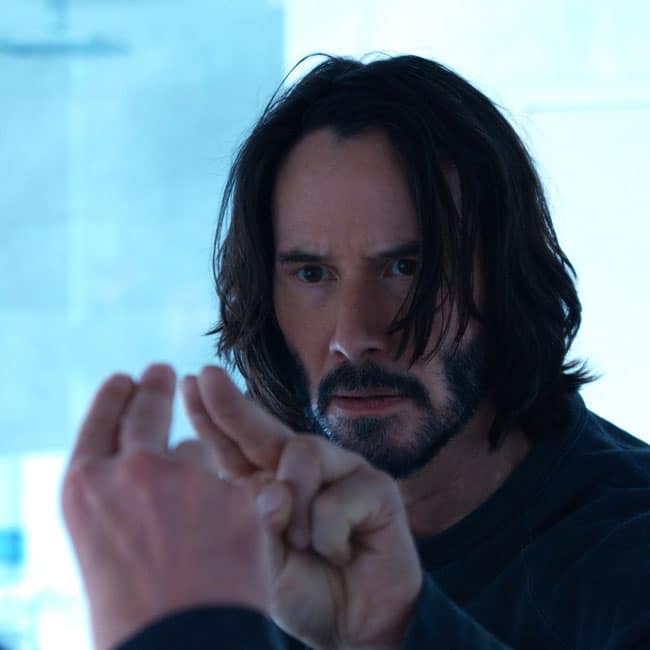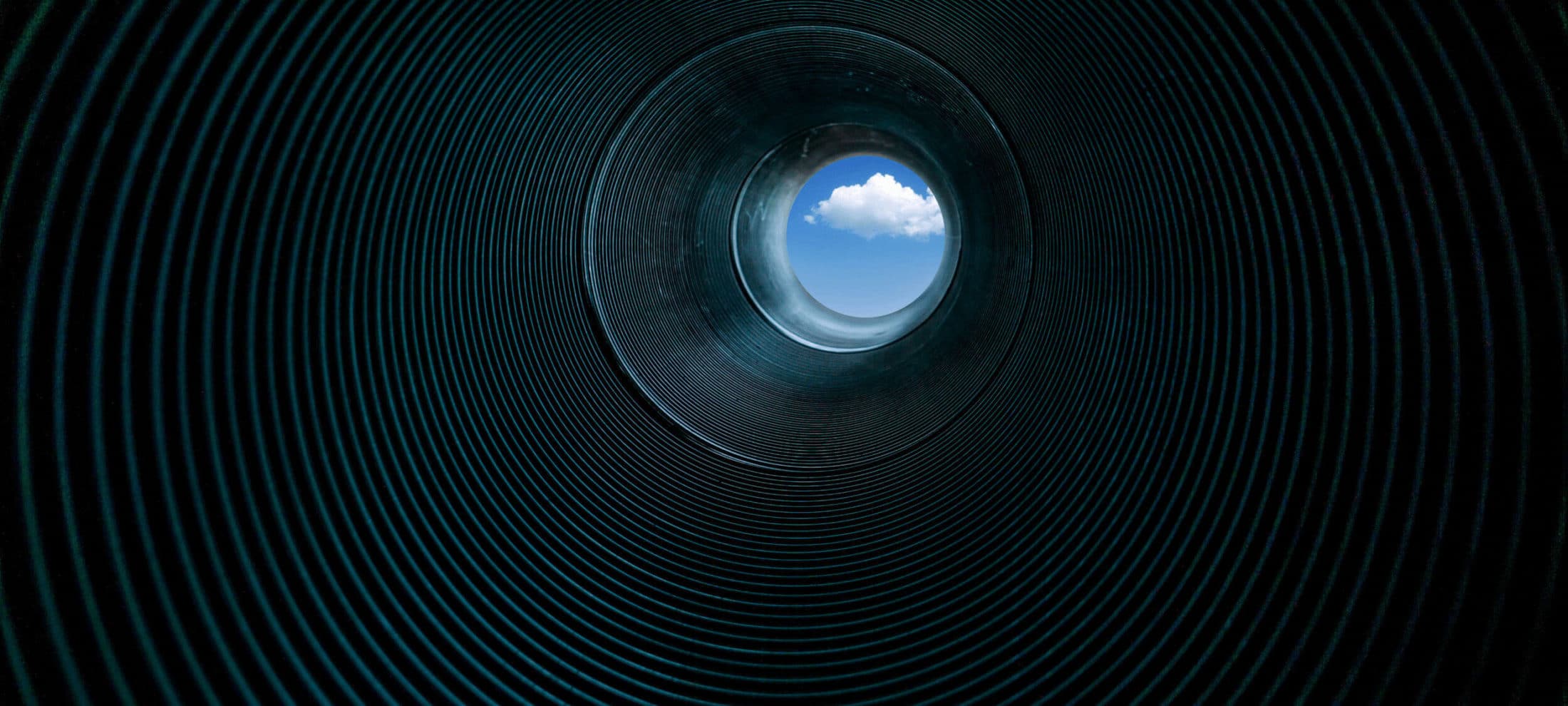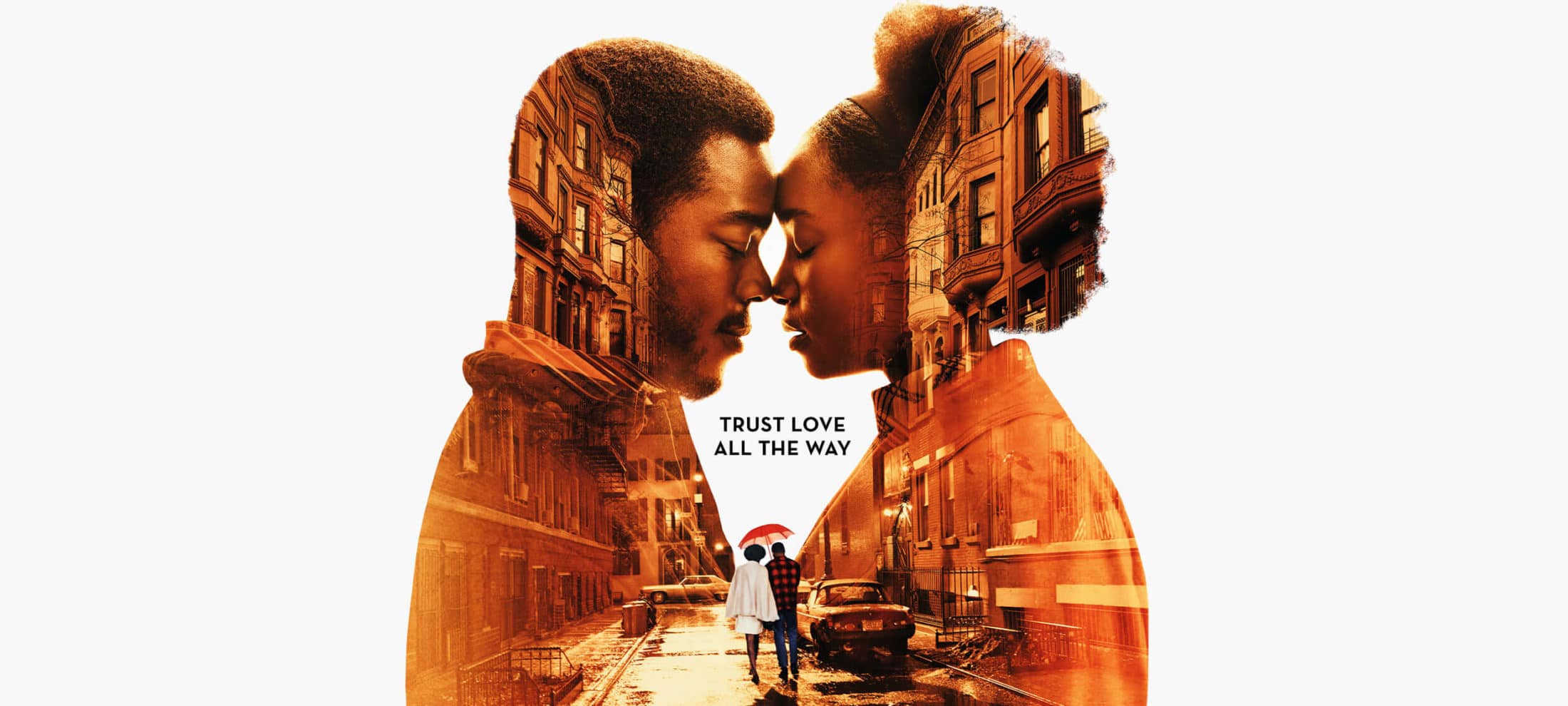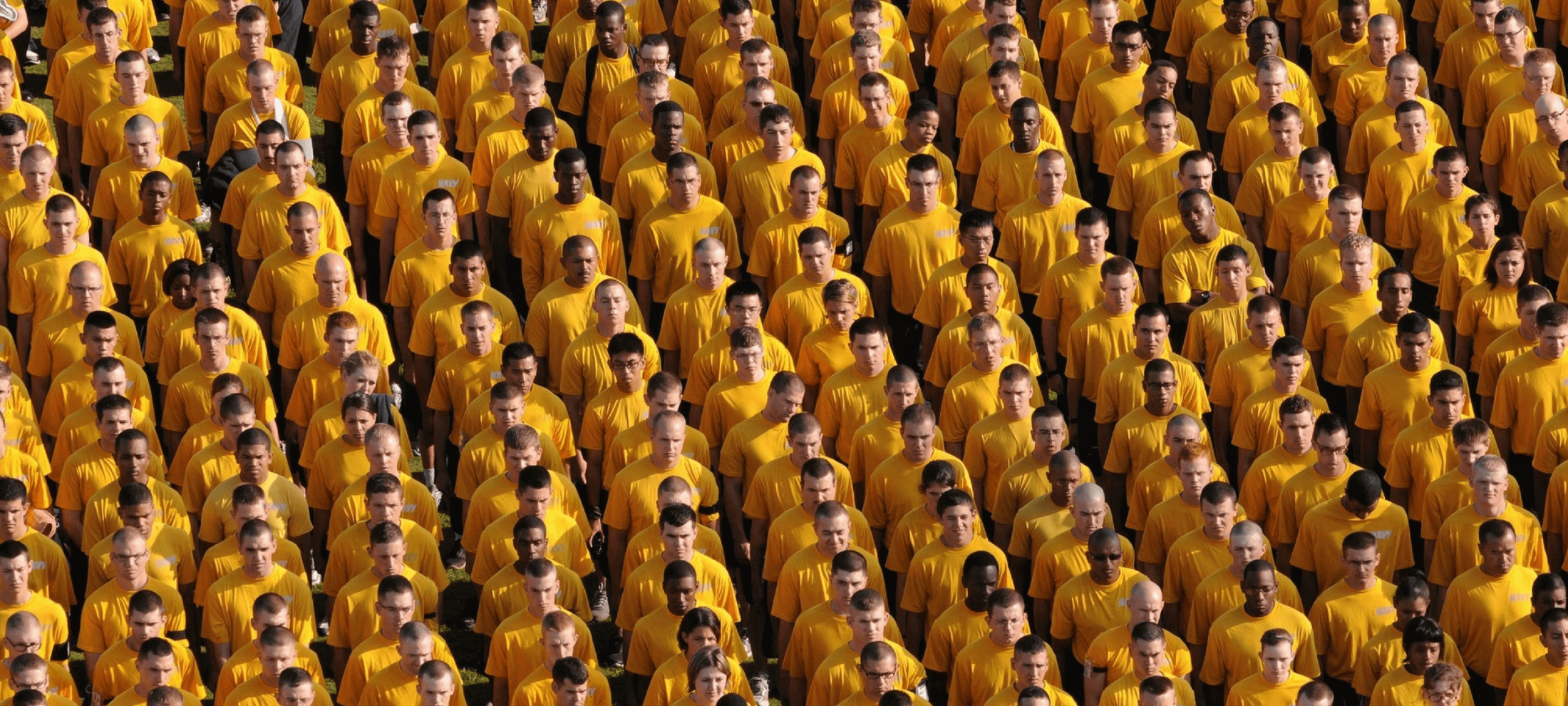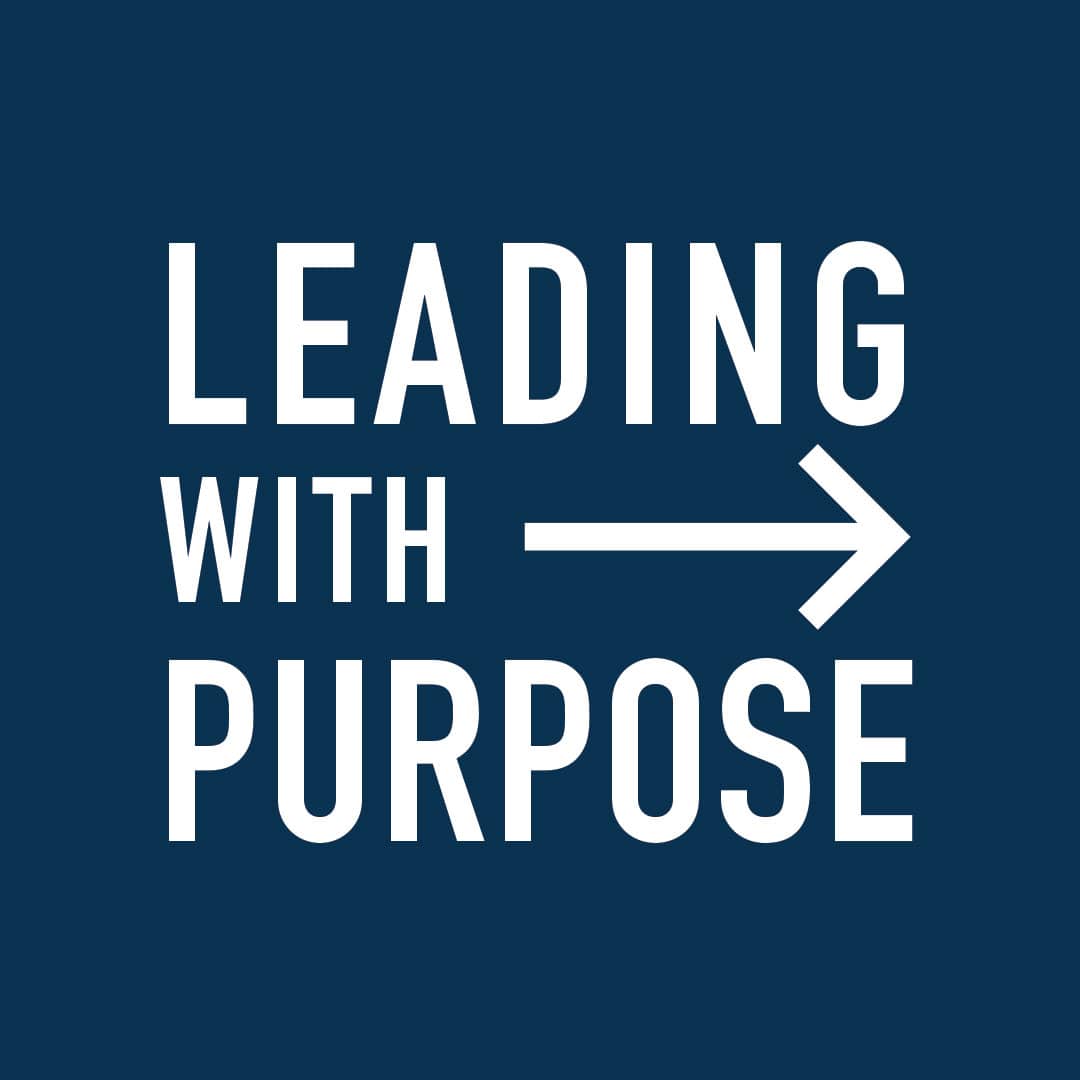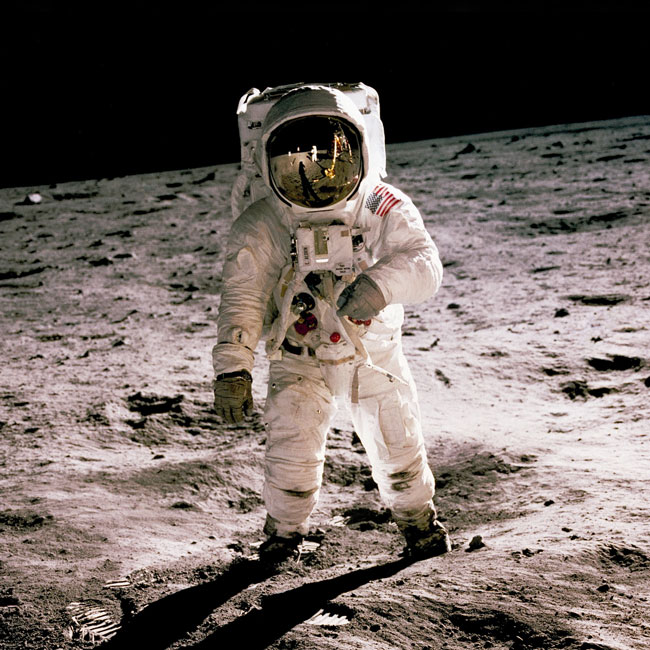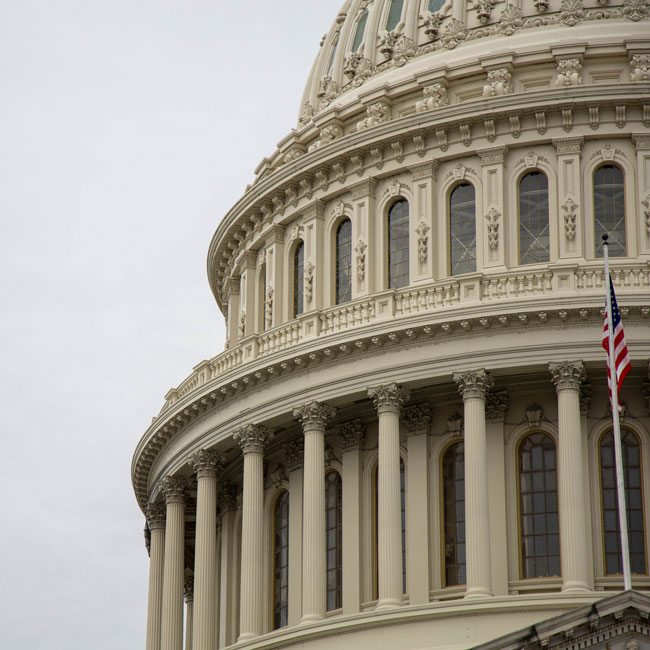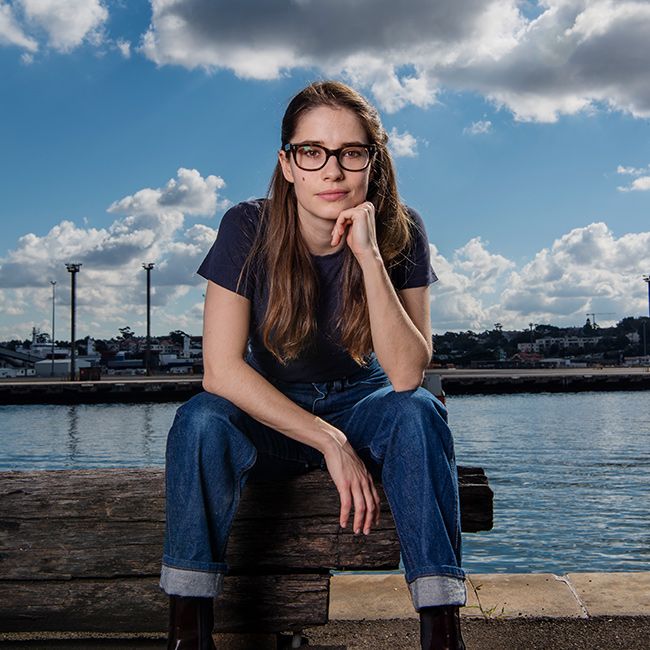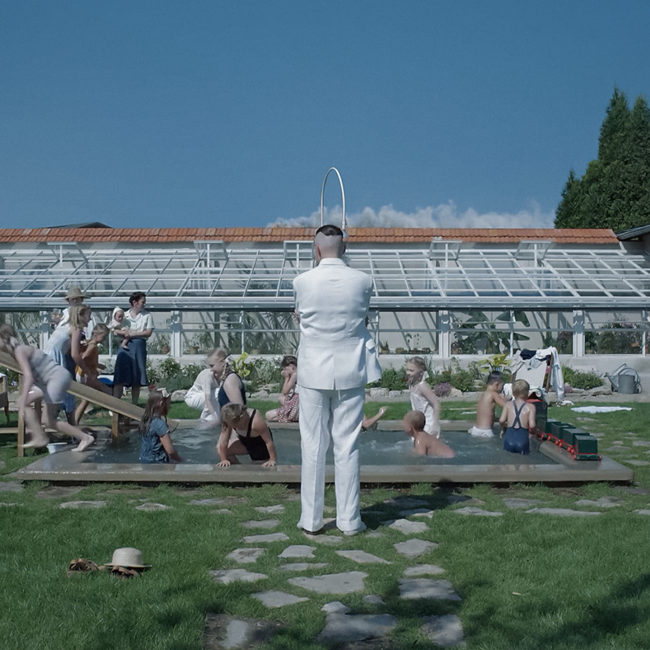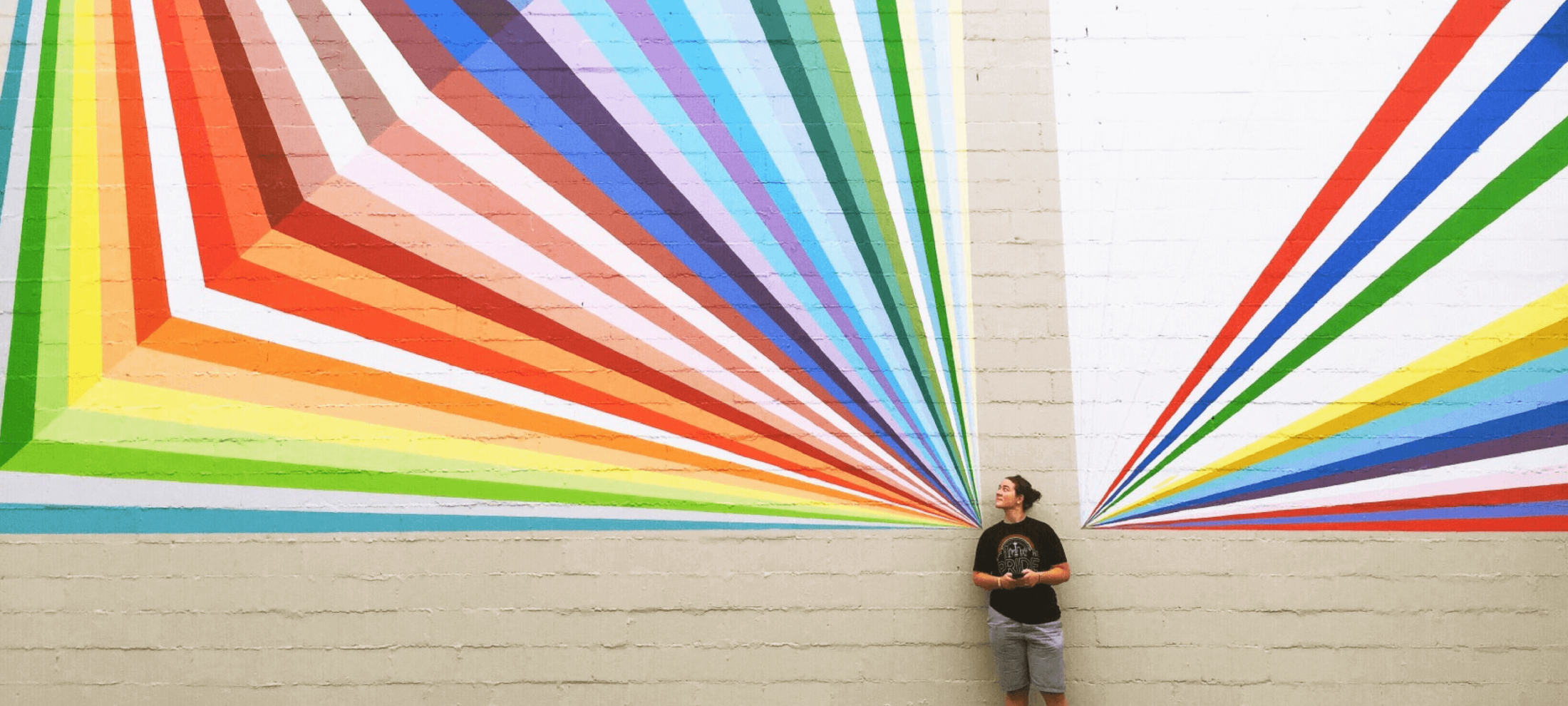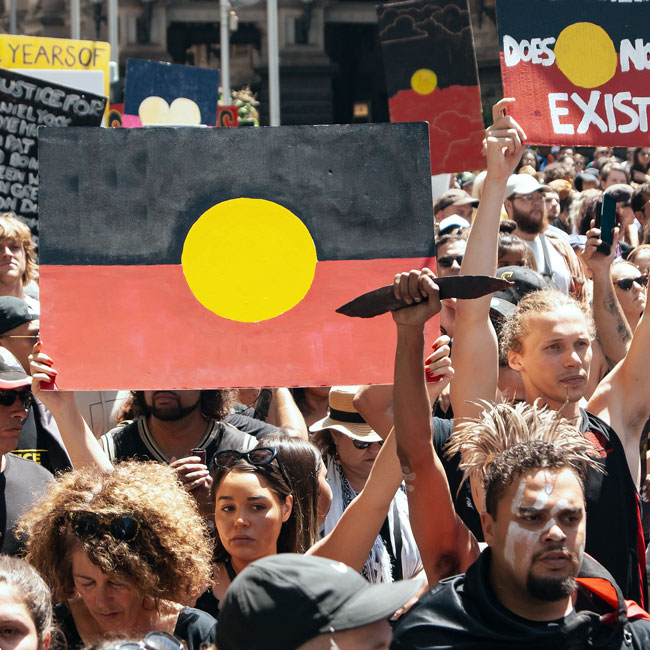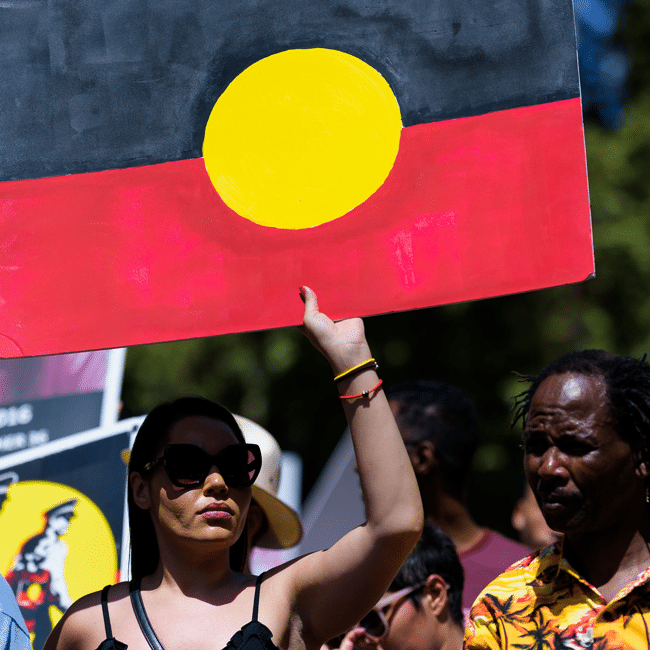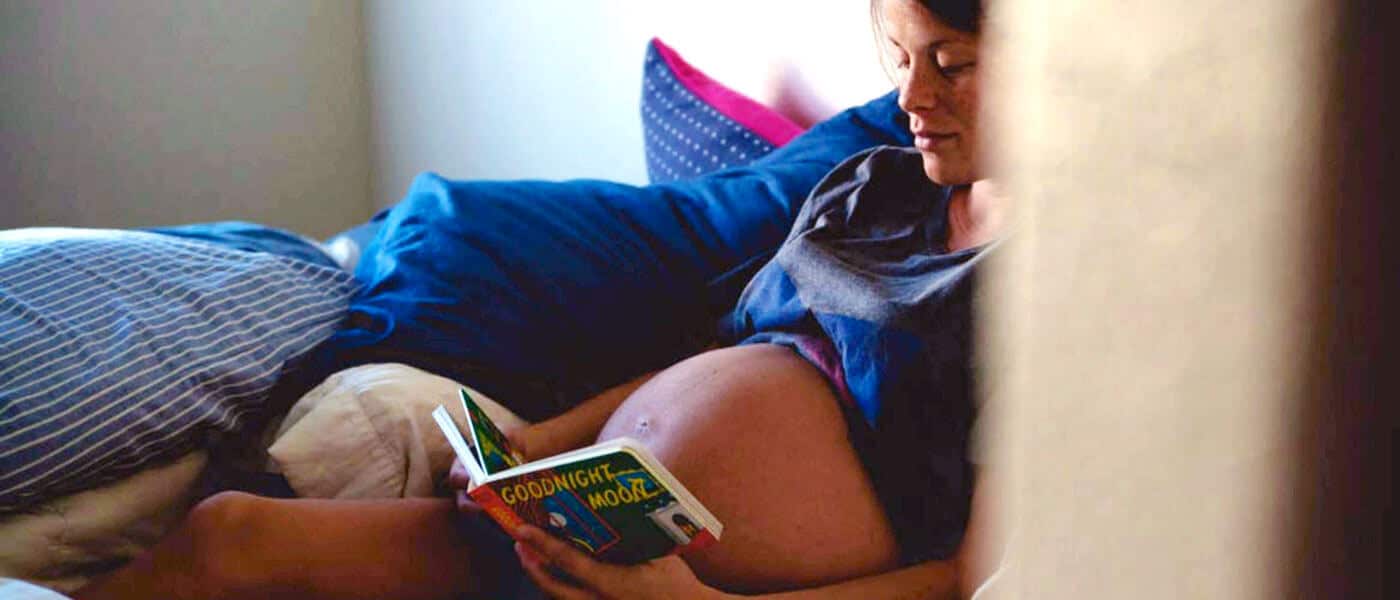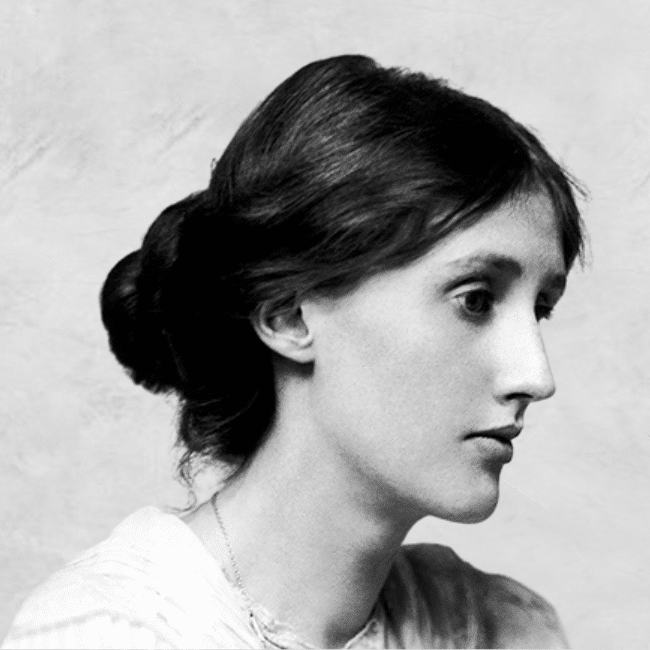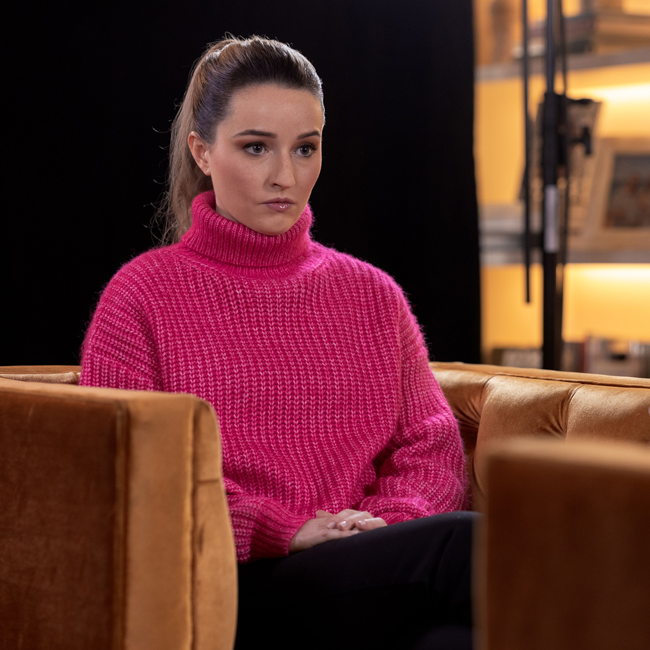Ethics Explainer: The Other

It’s sometimes said that if we were to find ourselves alone, stranded on a desert island, there’d be no need for us to think about ethics. It’s probably not true, strictly speaking, but it’s a useful way of demonstrating that an enormous amount of the work of ethics lies in puzzling out how we should make our way in a world jam-packed full of other people, all of whom are owed the same kind of respect we are.
As we become preoccupied with the busy, everydayness of our lives, we can often take the people around us for granted. In some cases, this mean we fail to be polite to them, or be grateful for the things they do to help us. In more extreme cases, we can objectify or commodify the people around us – treating them as though they were just tools for our own purposes, rather than people with rights and goals of their own. This runs against the moral imperative advocated by German philosopher Immanuel Kant to never treat people as a mere means to our own ends.
A common solution to this moral problem is to try to remind people of our ‘shared humanity’. We are advised to show empathy, imagine how other people might experience our words and actions and put ourselves in other people’s shoes. These strategies all boil down to one basic belief: if we can just realise how similar we are to the people around us, we’ll stop treating them poorly. For example, the Scottish philosopher David Hume believed sympathy was the foundation of ethics.
However, we should ask seriously how accessible other people’s minds are to us. Can a middle-aged white man really put himself in the shoes of a Rohingan woman being persecuted because of her faith, responsible for three children, none of whom have eaten in days? Perhaps not, and so it’s a problem if we argue that our moral concern needs to be grounded in a recognition of what we have in common. Because sometimes, we have nothing in common.
The Other is a term used to capture the ways other people are different from us. It’s also used to describe the people who we keep distant from us because we decide they’re not like us. The process of Othering occurs when we turn fellow humans into abstract entities we can distance ourselves from or treat as less-than-human.
We often think of our social relationships in terms of groups – we have an ‘in group’ and an ‘out group’. These groups are distinguished by who we identify ourselves with and who we identify ourselves against. Othering happens when we treat the members of the out group – the people we don’t identify with – as though they were less important than the members of our in group.
Philosopher Simone de Beauvoir thought “Otherness is a basic category of human thought”. As soon as we think about what something is, we think about the opposite – the Other. However, natural or not, Othering isn’t a neutral process – it tends to lead to the mistreatment of the people we decide are Other.
Once we identify the Other it becomes easier to justify treating them in ways we wouldn’t treat a fellow person. We can abuse, exploit or persecute them without feeling guilty. Othering was a factor in enabling the Holocaust, the slave trade and the Rwandan genocide. In each case, the victims’ humanity became invisible because people focussed on what made them different.
Given this, it would seem like the solution to Othering would be, as David Hume suggests, to focus on what we have in common rather than what sets us apart. But this isn’t a perfect solution either, because the process of distinguishing who we are from who we’re not is part of the way we develop our identity.
By focussing only on what is similar between us and other people, we lose an important tool in discovering our personal identity. Oftentimes it’s our differences that make us unique.
When we look at people as being ‘like us’, it can help us to relate but it can also be a little bit narcissistic. Instead of looking on the Other as someone unique, complicated and different, we treat them like a mirror. We try to find ourselves in other people instead of trying to find what defines them as them.
The philosopher Emmanuel Levinas thought process of engaging with the Other and acknowledging the differences between us and them was the basis of ethics. All our theories, concepts and ideas about what to do and how to live start by acknowledging that we must engage with other people who are different from us. Levinas believed that this otherness – which he called alterity – was something to celebrate. Rather than looking for commonality to ground our moral concern, we should recognise that another person is a universe of mystery to us. Something to fill us with awe, care and concern.
Encountering the Other is difficult. The Other challenges our way of doing things, demands our attention and holds us responsible for our actions. Their presence forces us to rethink our understanding of the way the world works. It’s much easier to overlook that difference by looking for similarities or make those differences seem evil than it is to genuinely engage with them. Yet this is exactly what Levinas wanted us to do.
In fact, Levinas wanted us to look the Other in the face. In doing so, we look upon the face of someone completely different from us. We also start to recognise our ethical responsibility toward them, which is a really simply one: don’t kill them.
Think of all the films and stories where someone is about to commit an act of murder until at the last minute they see the eyes of the person they’re going to kill. Suddenly, they can’t do it. One explanation for these changes of heart is that in looking into the Other’s face, these people realise their ethical responsibilities.
This philosophy of the Other is powerful because it encourages us to rethink our attitude toward difference. It acknowledges there are real and sometimes insurmountable differences between us but tells us that’s OK. Instead of getting caught up searching for what we have in common or stigmatising the things that set us apart, we should be open to learning from every individual we come across – no matter how much or how little of ourselves we see in them.
Ethics in your inbox.
Get the latest inspiration, intelligence, events & more.
By signing up you agree to our privacy policy
You might be interested in…
Opinion + Analysis
Relationships, Society + Culture
Nothing But A Brain: The Philosophy Of The Matrix: Resurrections
Opinion + Analysis
Health + Wellbeing, Relationships
Should parents tell kids the truth about Santa?
Opinion + Analysis
Politics + Human Rights, Relationships
Do Australia’s adoption policies act in the best interests of children?
Explainer
Relationships
Ethics Explainer: Moral Absolutism
BY The Ethics Centre
The Ethics Centre is a not-for-profit organisation developing innovative programs, services and experiences, designed to bring ethics to the centre of professional and personal life.
Ethics Explainer: Akrasia

If you’ve ever helped a child to master toileting, you’ll know of the moment where your patience and understanding expires.
It’s somewhere between the sixth wet bed and the poo stains on the walls, where you beg, implore the child to explain. “You know how to use the toilet, why don’t you just do it?!”
Well, park that frustration friend, because if the ancient Greek philosopher Aristotle is to be believed, we’re all a bit like that child, smearing shit on the walls despite knowing better. Aristotle believed in something he called akrasia – which is usually translated as ‘weakness of the will’, but I prefer to translate it as ‘incontinence’.
That’s right, Aristotle thought most of us had, at one stage or another, a leaky ethical bladder. We know what’s right and wrong; we know how we should act, and yet we wet ourselves rather than actually doing it.
This happens, according to Aristotle, for two reasons. First, passion. There are times when our emotions, ego, excitement or panic get the better of us, and our reason disappears. This can lead us to violence, cruelty, thoughtlessness or any number of things that we know are wrong. Like a toddler wetting themselves in fear or excitement, our moral restraint and discipline is overwhelmed by the emotion of the moment.
This form of akrasia often feels like being ‘swept up’ in the moment. We suddenly find our fists clenched, we find ourselves unable to swallow a hurtful thought – we are, for all intents and purposes – not in control. However, we’re responsible for our lack of control. According to most scholars who believe akrasia is a thing, we lose control because we haven’t worked hard enough to master ourselves. “I’m sorry I said that, I totally lost control,” is an explanation here – not an excuse.
The second way we can be overwhelmed is weakness. Sometimes we are the child who just doesn’t make it to the bathroom in time and has an accident on the floor. Morally, we know that we should try to minimise carbon emissions and that means we should get out of our pyjamas and walk the five minutes to pick up takeaway. But wouldn’t it be faster, and easier, to drive? Here, it’s clear what should be done. It’s just we don’t have the strength of will to do it.
Akrasia of this kind is different to the ‘heat of the moment’ stuff we discussed above. In this case, the little voice in our heads is nagging at us: ‘you should say something’, ‘you shouldn’t be doing this’, ‘that’s your son’s Easter chocolate Matt, you shouldn’t be eating it’… stuff like that. Here, we’re perfectly aware of our failing and watch ourselves fail, seemingly incapable of doing otherwise.
However, there are some who believe akrasia is actually impossible. They reject outright the idea that someone can know what is right to do and also refuse to do that thing. Here’s how their argument looks:
- Every choice people make is made because they see something good in that action.
- Therefore, nobody willingly chooses to do something bad.
- When people appear to be choosing to do something bad, it is because they think that bad thing is, in some way, good.
- Bad things happen because people are mistaken about what’s good.
The belief behind akrasia is that we can know – really know – what’s good and shit the bed when it comes to actually doing it. But would someone who really understood why we need to speak up against abuses of power ever remain silent? Critics of akrasia think not. They think the reason why someone wouldn’t speak up against a bully is because they’ve decided that in this situation, they momentarily believe that the good of personal safety trumps the good of justice. That is, the source of unethical behaviour is in mistaken beliefs, not in weak character.
However, this kind of reasoning comes close to committing the ‘No True Scotsman’ fallacy. The This fallacy, named is named for the Scottish-themed anecdote used to demonstrate it, is a kind of circular reasoning. Here’s how it looks:
- Claim: All Scots are brave and never flee battle
- Counter-evidence: But MacDougall is a Scot and he fled battle yesterday!
- Denial of evidence: MacDougall isn’t a true True Scots are brave and never flee battle.
The No True Scotsman is a way of shifting the goal posts so counterfactuals can’t actually disprove your claim. They are just reworked to support it further.
Critics of akrasia seem to make a similar claim:
- Claim: People do the wrong thing because they don’t know what’s right
- Counter-evidence: Yesterday I knew I should have returned the wallet I found with the cash still inside, but I took the cash and then returned the wallet
- Denial of evidence: You didn’t truly know that’s what you should have done. Otherwise, you would have done it.
This might seem like an academic dispute. And that’s because it is. But it’s also one that matters. Being able to identify the source of ethical failure is crucial if we’re going to prevent it. If ethical failures are problems of knowing and understanding what is good and why it’s good, then the solution is going to involve a lot of education.
If instead, ethical failures are connected to weakness of the will, then our ethics training needs to look a bit more like toilet training: getting us to identify the cues, knowing what to do ahead of time and having the strength to hold on, even when our will seems like it’s going to give way.
Ethics in your inbox.
Get the latest inspiration, intelligence, events & more.
By signing up you agree to our privacy policy
You might be interested in…
Opinion + Analysis
Politics + Human Rights, Relationships, Society + Culture
Film Review: If Beale Street Could Talk
Opinion + Analysis
Relationships
Metaphysical myth busting: The cowardice of ‘post-truth’
Explainer
Relationships
Ethics Explainer: Respect
Opinion + Analysis
Health + Wellbeing, Relationships
Want to live more ethically? Try these life hacks
BY Matthew Beard
Matt is a moral philosopher with a background in applied and military ethics. In 2016, Matt won the Australasian Association of Philosophy prize for media engagement. Formerly a fellow at The Ethics Centre, Matt is currently host on ABC’s Short & Curly podcast and the Vincent Fairfax Fellowship Program Director.
BY The Ethics Centre
The Ethics Centre is a not-for-profit organisation developing innovative programs, services and experiences, designed to bring ethics to the centre of professional and personal life.
Ethics Explainer: Consent

In many areas of life, being able to say “yes”, to give consent, and mean it, is crucial to having good relationships.
Business relationships depend on it: we need to be able to give each other permission to make contracts or financial decisions and know that the other person means it when they do.
It’s crucial to our relationships with experts who we rely on for critical services, like doctors, or the people who manage our money for us: we need to be able to tell them our priorities and authorise the plans they devise in light of those priorities. And romantic relationships would be nothing if we couldn’t say “yes” to intimacy, sexuality, and the obligations we take on when we form a unit with another person.
Giving permissions with a “yes” is one of our most powerful tools in relationships.
Part of that power is because a “yes” changes the ethical score in a relationship. In all the examples we’ve just seen, the fact that we said “yes” makes it permissible for another person to do something to or with us – when without our “yes”, it would be seriously morally wrong for them to do that very same thing. This difference is the difference of consent.
Defining Consent
Without consent, taking someone’s money is theft: with consent, it’s an investment or a gift. Without consent, entering someone’s home is trespass. With consent, it’s hospitality. Without consent, performing a medical procedure on someone is a ghoulish type of battery. With it, it’s welcome assistance.
The same action looks very morally different depending on whether we have said “yes”. This has led some moral philosophers to remark that consent is a kind of “moral magic”.
Interestingly, there are times when this moral magic can be cast even when a person has not said “yes”. In the political arena, for instance, many philosophers think it doesn’t take very much for you to have consented to be governed. Simply by using roads, or not leaving the territory your government controls, you can be said to have consented to living under that government’s laws.
The bar for what counts as consent is set a lot higher in other areas, like sexual contact or medical intervention. These are cases when even saying “yes” out loud might not be enough to cast the “moral magic” of consent: we can say “yes”, but still not have made it okay for the other person to do what they were thinking of doing.
For instance, if a person says “yes” to sex or to get a tattoo because they are drunk, at gunpoint, ill-informed, mistaken, or simply underage, most ethicists agree it would be wrong for a person to do whatever they have said “yes” too. It would be wrong to give them the tattoo or try to have sex with them, because even though they’ve said “yes”, they haven’t really given consent.
This leads philosophers to a puzzle. If saying “yes” alone isn’t enough for the moral magic of consent, what is?
Do we need the person to have a certain mental state when they say “yes”? If so, is it the mental state, the combination, or just the “yes” that really matters? This is a long and wide-ranging debate in philosophical ethics with no clear answer.
Free and Informed
Recently ethicist Renee Bolinger has argued that the real question is not what consent is, but how best to avoid the “moral risk” of doing wrong. She argues that in this light, we can see that what matters is not what consent is, but what our rules around consent should be, and those rules should consider consent a ‘performance’, or an action, such as speaking or signing something.
Some policy efforts have tried to come up with “rules about consent” that codify when and why a “yes” works its moral magic. There is the standard of “free and informed” consent in medicine, or “fair offers” in contracts law. Ethicists, however, worry that these restrictions are under-described, and simply push the important questions further down the line. For instance, what counts as being informed? What information must a person have, for their “yes” to count as permission?
We might think that knowing about the risks is important. Perhaps a person needs to know the statistical likelihood of bad outcomes. However, physicians know that people tend to over-prioritise relatively small risks, and in emotional moments can be dissuaded from a good treatment plan by hearing of “a three in a million” risk of disaster. So would knowledge of risk be sufficient for informed consent, or do we need to actually know the probability?
There is a final important question for our thinking about consent. Whatever consent is, are there actions you cannot consent to?
A famous court case called R v Brown established in 1993 that some levels of bodily harm are too great for a person to consent to, whether or not they would like to experience that harm. In any area of consent – medicine, financial, sexual, political – this is an important and open question.
Should people be able to use their powers of consent to do harm to themselves? The answer may depend on what we mean by harm.
Ethics in your inbox.
Get the latest inspiration, intelligence, events & more.
By signing up you agree to our privacy policy
You might be interested in…
Opinion + Analysis
Business + Leadership
Risky business: lockout laws, sharks, and media bias
Opinion + Analysis
Business + Leadership
Leading ethically in a crisis
Big thinker
Business + Leadership
Big Thinker: Karl Marx
Opinion + Analysis
Business + Leadership, Science + Technology
Finance businesses need to start using AI. But it must be done ethically
BY The Ethics Centre
The Ethics Centre is a not-for-profit organisation developing innovative programs, services and experiences, designed to bring ethics to the centre of professional and personal life.
There’s something Australia can do to add $45b to the economy. It involves ethics.

There’s something Australia can do to add $45b to the economy. It involves ethics.
Opinion + AnalysisBusiness + LeadershipSociety + Culture
BY The Ethics Centre 29 OCT 2020
Australia faces a perfect storm. An economic deficit, a global pandemic, an uncertain future of work, and long-term social and environmental change around the climate crisis and reconciliation with Indigenous Australians to name but a few.
Adding to this magnitude of challenges are the low levels of trust Australians have in our leaders and our neighbours. In fact, research has found that only 54% of Australians generally trust people they interact with, and as a nation we score ‘somewhat ethical’ on the Governance Institute’s Ethics Index.
How do we navigate the road ahead? One thing is abundantly clear: we need better ethics. That’s why we commissioned Deloitte Access Economics to find out the economic benefits of improving ethics in Australia.
The outcome is The Ethical Advantage, a report that uses three new types of economic modelling and a review of extensive data sets and research sources to mount the case for pursuing higher levels of ethical behaviour across society.
For the first time, the report quantifies the benefits of ethics for individuals and for the nation. The ethical advantage is in, and the findings are compelling. They include:
A stronger economy: If Australia was to improve ethical behaviour, leading to an increase in trust, – average annual incomes would increase by approximately $1,800. This in turn would equate to a net increase in total incomes of approximately $45 billion.
More money in Australians pockets: Improved ethics leads to higher wages, consistent with an improvement in labour and business productivity. A 10% increase in ethical behaviour is associated with up to a 6.6% in individual wages.
Better returns for Australian businesses: Unethical behaviour leads to poorer financial outcomes for business. Increasing a firm’s performance based on ethical perceptions, can increase return on assets by approximately 7%.
Increased human flourishing: People would benefit from improved mental and physical health. There is evidence that a 10% improvement in awareness of others’ ethical behaviour is associated with a greater understanding one’s own mental health.
The report’s lead author and Deloitte Access Economics partner, Mr John O’Mahony, said:
“No one would seriously argue that pursuing higher levels of ethical behaviour and focus was a bad thing, but articulating the benefits of stronger ethics is more challenging.”
“Our report examines the case for improving ethics as a way of addressing these broader economic and social challenges – and the nature and extent of the benefits that would accrue to the nation if we got this right.”
The report also identifies five inter–linked areas for improvement for Australia and its approach to ethics, supported by 30 individual initiatives:
- Developing an Ethical Infrastructure Index
- Elevating public discussions about ethics
- Strengthening ethics in education
- Embedding ethics within institutions
- Supporting ethics in government and the regulatory framework
The findings and recommendations demonstrate the value of The Ethics Centre’s continued contribution to Australian life. For thirty years, The Ethics Centre has aimed to elevate ethics within public debate, organisations, education programs and public policy. Executive Director of The Ethics Centre, Dr Simon Longstaff said the findings validate the impact of those activities and reveals the potential that can be unlocked with greater support.
“The compelling moral argument that ethical behaviour binds a society and its institutions in a common good is now, thanks to Deloitte Access Economics’ research and modelling, also a compelling economic argument. Best of all, we need not be perfect – just better.”
A copy of The Ethical Advantage can be found at this link.
Ethics in your inbox.
Get the latest inspiration, intelligence, events & more.
By signing up you agree to our privacy policy
You might be interested in…
Opinion + Analysis
Business + Leadership
Ethics in engineering makes good foundations
Opinion + Analysis
Business + Leadership, Politics + Human Rights
Can philosophy help us when it comes to defining tax fairness?
Opinion + Analysis
Business + Leadership
Feel the burn: AustralianSuper CEO applies a blowtorch to encourage progress
Opinion + Analysis
Business + Leadership
An ethical dilemma for accountants
BY The Ethics Centre
The Ethics Centre is a not-for-profit organisation developing innovative programs, services and experiences, designed to bring ethics to the centre of professional and personal life.
Businesses can’t afford not to be good

Businesses can’t afford not to be good
Opinion + AnalysisBusiness + Leadership
BY The Ethics Centre 28 OCT 2020
A famous New Yorker cartoon depicts a businessman sitting by a campfire, still in his suit, speaking to two young children.
“Yes, the planet got destroyed,” he concedes. “But for a beautiful moment in time we created value for shareholders.”
The logic seems perverse, but more the worrying reality is that in reality, it’s quite pervasive. We’ve seen Royal Commissions into aged care and financial services, growing pressure on tech companies to address social issues and the overwhelming pressure for businesses to address climate change. Despite this, we have seen very few organisations making meaningful investments into ethics.
We should worry that we’re living in the campfire CEO’s beautiful moment in time.
At The Ethics Centre, we’ve spent over thirty years getting into what makes organisations tick. How they’re motivated, what they care about and what goals they serve. Time and again, we’ve seen how the real desire to act with integrity, uphold customer interests and attend to vulnerable people is pitted against business imperatives.
No matter how many scandals we see, the message still seems to be the same: while you’re successful, you can be ethical. But if you’re not successful, you’ll need to park your ethics till you are.
This is the campfire CEO’s logic. By focussing on the (often illusory) short–term value captured that ethical shortcuts can at times promise, businesses lose out in the long run. And thanks to new research commissioned by The Ethics Centre, we now know exactly how much businesses are losing out on by giving away the Ethical Advantage. We also know how much courageous businesses gain by making ethics a priority.
Research by Deloitte Access Economics has revealed that businesses who are seen as ethical – fair in business, transparent and open – enjoy a higher returns on assets. They are also less likely to have staff experiencing mental health issues, because when we believe the people around us are ethical, we experience less mental health challenges.
What’s more, if we are able to improve the ethical standing of enough people and businesses, we’ll not only boost business returns, we’ll improve wages and GDP. Nice guys are the tortoises of the business world. They finish first in the long run.
Cris Parker, head of the Ethics Alliance, a community of businesses committed to a more ethical way of working, says “when organisations make a concerted effort to invest in ethics, they create an environment where good intentions are just the beginning.”
She believes it is when ethics shifts from being a leader’s obligation to being a shared responsibility that real change happens. “It’s the cumulation of every employee serving that purpose, doing the right thing that really makes the difference. “
Realising these benefits requires us to recognise the source of the campfire CEO’s error: economic narrow-mindedness. The willingness to destroy the planet in favour of business returns (which is, in fairness, a caricature of most of today’s business leaders) demonstrates a failure to recognise how dependent our economy is on the wellbeing of the planet.
Similarly, pursuing economic returns without considering the means by which they’re achieved ignores the crucial role that trust, integrity and character plays in preserving our economy.
We don’t trade with people we think are going to betray us. We don’t invest when we can’t trust others to be careful with our investments.
Michelle Bloom leads The Ethics Centre’s consulting and leadership team. She believes ethical improvement requires us to embrace complexity rather than looking for simple solutions.
“Today, business leaders are dealing with very complex operating environments where action and bottom–line results are rewarded over reflection, perspective seeking and co-ordination. This haste to decide without deliberation limits leaders to mechanistic solutions where systemic, novel and context–specific approaches are required.”
Unfortunately, realising these benefits is harder than it seems.
Much like an optical illusion you can only properly see by looking away from it, the economic benefits of ethics are only likely to be realised by those who seek it with integrity rather than a hunger for profit.
Hypocrites and cynics need not apply for the ethical advantage. But for the sincere and the patient, results will come in time. However, it will require businesses to campaigning not just for their industries to be better as a whole, but for the large-scale Ethical Infrastructure investments Australia needs to ensure we have trustworthy markets, institutions and systems.
For Michelle Bloom, alongside large-scale change, organisations need to get their own house in order. “Embedding an Ethics Framework into the organisational system and its processes is the first step,” she says. Next is developing your leaders’ systemic and ethical thinking to make good decisions in complexity as well as ensuring the culture of the organisation aligns to your Ethics Framework.”
Each of these steps, alongside developing the capacity for good decision-making and embedding ethics into the design of all products and services, are markers of the kind of integrity that grants the Ethical Advantage.
In our line of work, we often hear from so-called pragmatist who see ethics as a nice idea that doesn’t work in the real world. The numbers are in, and it turns out the most pragmatic thing to do is make ethics a top priority. Anything else would be bad business.
Ethics in your inbox.
Get the latest inspiration, intelligence, events & more.
By signing up you agree to our privacy policy
You might be interested in…
Opinion + Analysis
Business + Leadership, Health + Wellbeing, Relationships
Office flings and firings
Opinion + Analysis
Business + Leadership
The anti-diversity brigade is ruled by fear
Opinion + Analysis
Business + Leadership
Who are corporations willing to sacrifice in order to retain their reputation?
Opinion + Analysis
Business + Leadership
Productivity isn’t working, so why not try being more ethical?
BY The Ethics Centre
The Ethics Centre is a not-for-profit organisation developing innovative programs, services and experiences, designed to bring ethics to the centre of professional and personal life.
Ethics Explainer: Ethical Infrastructure

Ethics Explainer: Ethical Infrastructure
ExplainerBusiness + Leadership
BY The Ethics Centre 27 OCT 2020
When we think about the kinds of things a society needs for its survival and flourishing, we tend to begin with the basic necessities.
A society needs enough food to feed everyone, road and transport infrastructure, housing. It needs laws to manage how people treat one another, systems of government to make decisions. In a modern society, complex communications and other forms of technical infrastructure are required.
Each of these this is a component of a society’s infrastructure. Each is essential to the common good, survival and wellbeing of a society. However, just as essential for the wellbeing of a society is ethical infrastructure – the formal and informal means by which society regulates the use of power by both public and private institutions to ensure it serves the common good.
The term ethical infrastructure has been used in a number of countries around the world, including The United States of America. However, it has typically been used to refer to systems of control, compliance and risk management. There is an opportunity to expand the idea of ethical infrastructure so it does not simply refer to the basic rules of public service.
A society can have a clear set of rules and principles about appropriate spending, disclosure of interests and so on, and still not have systems and institutions that serve the common good. We need only look at the United States for proof of this.
This is why it is better to consider ethical infrastructure to be a collection of institutions, systems, norms and processes that we use to ensure not only that society is operating effectively, but that it is operating ethically.
To understand why this is necessary, consider the fact that there is a person or group who is responsible for, and in control of, each piece of social, physical or digital infrastructure we have and need. This control confers power. The power to give or deny essential resources to some groups, to favour some people over others or to mismanage those resources due to incompetence, laziness or selfishness.
Handing this kind of power over to somebody without some assurance they will use it well would be reckless and foolish. Indeed, some of the most influential voices in Western political philosophy – Thomas Hobbes, John Locke, Jean-Jacques Rousseau and John Rawls – have argued that it’s only when the powerful are willing to act in the interests of those they are meant to serve that they should have any power at all. Ethical infrastructure refers to the means by which a society can ensure power is exercised in the common interest, and take meaningful action when it is not.
A clear example of a piece of ethical infrastructure would be laws, policies and systems protecting the actions of whistleblowers, who draw attention to unethical behaviour – often by the powerful. Many organisations lack appropriate systems and processes for employees to flag ethical issues, and even if they have these processes, there are often cultural factors that mean those processes don’t have the results they should. This can drive some whistleblowers to look for other avenues outside their organisation, but often do not feel supported – practically or legally – in doing so.
Thinking about an issue like this as a challenge of ethical infrastructure helps us see it as a systemic issue. It is not simply a matter of new laws. We also need to normalise new ways of thinking about dissenting, concerned or outspoken staff within our organisations.
We need to ensure individuals have the training and support they need to identify and draw attention to ethical issues and we must have appropriate accountability in cases where it appears important information has been covered up or kept secret. This complex and powerful network of norms, policies, institutions, processes and people is a society’s ethical infrastructure.
Each aspect of a society’s infrastructure is designed to allow its citizens to flourish: provided with the means to live prosperously, confidently, safely and well. Ethical infrastructure serves this goal in two ways. First, it ensures the other aspects of our infrastructure are serving everyone’s needs, and second, it gives people the confidence to take risks, act creatively and magnanimously, trust in their neighbours, leaders and institutions and feel confident in theirs and their loved ones futures.
Because without this, no amount of sophisticated infrastructure will secure what we’re all searching for: a life worth living.
Ethics in your inbox.
Get the latest inspiration, intelligence, events & more.
By signing up you agree to our privacy policy
You might be interested in…
Opinion + Analysis
Business + Leadership, Climate + Environment
The business who cried ‘woke’: The ethics of corporate moral grandstanding
LISTEN
Business + Leadership
Leading With Purpose
Opinion + Analysis
Business + Leadership, Science + Technology
One giant leap for man, one step back for everyone else: Why space exploration must be inclusive
Opinion + Analysis
Business + Leadership, Politics + Human Rights
No justice, no peace in healing Trump’s America
BY The Ethics Centre
The Ethics Centre is a not-for-profit organisation developing innovative programs, services and experiences, designed to bring ethics to the centre of professional and personal life.
Meet Eleanor, our new philosopher in residence

Meet Eleanor, our new philosopher in residence
Opinion + AnalysisRelationshipsSociety + Culture
BY The Ethics Centre 23 SEP 2020
At TEC, we firmly believe ethics is a team sport. It’s a conversation about how we should act, live, treat others and be treated in return.
That means we need a range of people participating in the conversation. That’s why last year, we asked for funding support to bring another philosopher into our team. Thanks to our donors, we are excited to share that we have recently appointed Eleanor Gordon-Smith as a Fellow. Already established as one of Australia’s leading young thinkers, Eleanor is a published author, broadcaster and in demand speaker. She’s also currently reading for her PHD at Princeton University. To welcome her on board and introduce her to you, our community, we sat down for a brief get-to-know-you chat with her.
Tell us, what attracted you to becoming a philosopher?
I remember sitting in my first philosophy class and feeling like this was what thinking should really be like. I left knowing less than I thought I did when I arrived – all my other classes were about the legislative agenda around human rights and my philosophy class said wait, what’s a right and what counts as human? I loved the ability to ask those questions and from that day on it’s always felt like that’s where the real action is: the deep questions that we too easily take for granted.
Do you specialise in a key area or areas?
I cross-specialise in ethics, language, and epistemology [the study of knowledge]. In all three areas I am interested in the powers we can only have because we are social creatures. I work on moral powers that we can only exercise in social settings – such as consent, and promise – how linguistic meaning can be constructed and destroyed by social relationships, and how being embedded in societies can facilitate or disrupt our processes of gaining knowledge. The uniting theme across my work is that we depend on each other for many of our most important abilities and powers, such as speaking, learning, or coming up with moral frameworks, and yet a lot of the time other people are very bad. So what are we to do, if we rely on each other for our most foundational abilities but frequently “each other” is the source of our problems? So far I only have the question. But that’s where all good philosophy starts…
Sounds like a phenomenal place to start. Now let’s have a fan-girl moment. Who is your favourite philosopher?
There are too many to name but Rae Langton, who spent a lot of time in Australia, is a huge inspiration for me, and I like to think about how to precissify Robert Adams’ remark which seems to me to get to the heart of moral philosophy: “we ought, in general, to be treated better than we deserve”.
Let’s jump over to COVID and restrictions, the impact these are having on our lives, our interactions, how we work and so on. What do you hope we learn or gain from this experience?
Truthfully I think the most we can hope for is a greater appreciation for the profound fragility of the things that normally keep us functioning. Our friendships, entertainment, ways of being in the world, all so easily threatened by simply not being able to leave the house very much. I have found that very humbling, and very difficult. I hope also we can learn to be a little more compassionate with ourselves about the fact that we are all creatures who need to live and will one day die. Before Covid, it was very easy to see each other and ourselves as our jobs, or athletic achievements, or how we’re measuring up to a set of criteria about how our lives “should” be going. Seeing everybody’s houses and children and needs via Zoom will I hope let us be compassionate about the fact that we all have them, and there’s no shame in taking care of them.
We’ve all had a guilty pleasure of sorts during the pandemic. Can you share with us yours?
I bought a robot vacuum cleaner and I like to follow him around and tell him he’s missed a spot.
Amazing. Let’s get to know you better. What is a standard day in your life?
I read a lot, work on [podcast] episode plans, put several thousand post-it notes on the wall – each one a piece of tape from an interview, a fact, a piece of theory, a well-phrased, or a scene – and rearrange them until I can see a story unfolding alongside a philosophical idea. I read philosophy, listen to a lot of radio and podcasts because there are so many clever people in that sphere whose work I admire, and try to stop by 9pm. Although if I’m honest, that’s rare these days.
You wrote a book – what is it about?
Stop Being Reasonable. It’s a series of true stories about how we change our minds in high-stakes moments and how rarely that measures up to our ideal of rationality. Each chapter features interviews I conducted with someone about a moment in their life that they changed their mind in a really drastic way: a man who left a cult, a woman who questioned her own memory of being abused, a man who changed his mind about his entire personality after appearing on reality TV, someone who learned their family wasn’t really their family, and so on. Each story highlights a sometimes-maligned strategy for reasoning that many of us turn out to use all the time, especially when it really matters: believing other people, trusting our gut, thinking emotionally, and so on. The book is a plea for a more capacious ideal of rationality, such that these things ‘count’ as rational thinking as well as the emotionless first-principles reasoning we usually associate with that term.
Let’s finish up close to home. What does ethics mean to you?
People sometimes think ethical thinking promises a set of answers. It might, but I think it’s much more about learning to ask a different set of questions. So many of our disagreements and deepest divisions are built on argumentative frameworks that we almost never dredge to the surface and examine. We take things for granted about what matters, why, how to measure it, and what follows from the fact that those things matter. Learning to think ethically is about examining those things – about realising which systems of value we subscribe to by accident, and trying to make our value systems more deliberate.
Ethics in your inbox.
Get the latest inspiration, intelligence, events & more.
By signing up you agree to our privacy policy
You might be interested in…
Opinion + Analysis
Society + Culture, Politics + Human Rights
‘The Zone of Interest’ and the lengths we’ll go to ignore evil
Explainer
Relationships
Ethics Explainer: Virtue Ethics
Big thinker
Politics + Human Rights, Relationships
Big Thinker: Eleanor Roosevelt
Opinion + Analysis
Business + Leadership, Health + Wellbeing, Relationships
Ending workplace bullying demands courage
BY The Ethics Centre
The Ethics Centre is a not-for-profit organisation developing innovative programs, services and experiences, designed to bring ethics to the centre of professional and personal life.
Ethics Explainer: Testimonial Injustice

Ethics Explainer: Testimonial Injustice
Opinion + AnalysisPolitics + Human Rights
BY The Ethics Centre Eleanor Gordon Smith 22 SEP 2020
Telling people things – or giving ‘testimony’ – is one of our quickest, oldest, and most natural ways of adding to human stores of knowledge.
Philosophers have spent thousands of years wondering when, and why, certain beliefs count as knowledge – and when certain beliefs count as justified. Many agree that when we are told something by someone reliable, trustworthy, and in possession of the facts, their testimony can be enough to justify a belief in what they say.
I can tell you that it will rain later, you can tell me which way the train station is, we can both go to a lecture by an expert and walk away knowing more.
But we can’t accept all the information we hear from other people. Not all testimony can ground knowledge – some of it is lies, errors or opinion. That’s why credibility is important to the process of learning by being told.
The enlightenment philosopher David Hume argued that we shouldn’t set our standing levels of credibility too high: he thought “testimonial beliefs” were only justified when we had back-up justification from other sources like our own eyes, readings, and observations.
Immanuel Kant, by contrast, thought that we had a “presumptive duty” to believe what our fellow humans told us, since believing them was a mark of respect.
Regardless of the debate about how much credibility we should give people, there’s no denying that how much credibility we do give plays a big role in what we can learn from each other, and whether we learn anything at all.
Sometimes we allocate credibility in ways that are unfair, unreasonable or outright harmful. Beginning in the 20th Century, Black and female philosophers started pointing out that women, people of colour, people who spoke with an accent, and people who bore visible markers of poverty were disbelieved at far higher rates than the general population.
Because of existing prejudices against these people, some ethicists posit, they are being systematically disbelieved when they speak about things they, in fact, are reliable experts about. This is what philosophers term “a credibility deficit”. People could experience a credibility deficit when they speak about elements of their own experience, like what it was like to be a woman in domestic servitude.
It could also include elements of the world around them – such as the denial of black people’s reports of violence by white men.
Credibility deficits are not just a matter of knowledge but a matter of justice: if we are not believed when we tell other people true things, we can be shut out of important social processes and ways of being recognized by other people. One of the most important ways that credibility deficits play out is in court, or in other reports to do with crimes and legal proceedings.
After abolition in the United States but before the civil rights movement, black peoples’ testimony was not recognised as a source of legal information in courts. That legacy has long undermined the way that black people’s testimony is viewed in courts, even today.
Philosopher Miranda Fricker uses a scene from To Kill A Mockingbird to highlight the way Tom’s race, when combined with his being in a white courtroom affects his Tom credibility. Though he is in fact telling the truth, and though there are no obvious reasons to disbelieve him, the white jurors in the American South are so trained by prejudice that they regard his race itself as a reason to disbelieve him. It is not the facts of the story itself that mean jurors do not believe it, but facts about who is telling it.
Clip: Tom Robinson’s cross-examination from To Kill A Mockingbird.
This was a common and tragic way that credibility deficits played out in the real world: there is a long history of white women being believed over black men even when they made false and damaging claims.
The tradition of “testimonial injustice” in philosophy argues that credibility misallocation is more than a mistake. It is an injustice because we have a moral duty to see other people as ‘full’ people and to treat them with respect, but discounting people’s word because of prejudice is a way of denying them that respect.
In some ways, to refuse to believe someone without defensible reasons is to refuse to recognise them as a person.
Philosophers like Miranda Fricker, Jose Medina, Dick Moran, and a long tradition of black feminist epistemology including Charles Mills and bell hooks have explored the ways that being a free and equal citizen requires being believed as one. There are wide-ranging debates among these thinkers over many areas inside testimonial injustice, including whether and why being believed is foundational to being seen as a person, what kinds of credibility we could ‘owe’ one another, and whether people besides the disbelieved party are wronged by a faulty allocation of credibility.
One important question is whether it could be wrong and if so to whom, to give out too much credibility instead of too little. If it’s unfair to afford someone too little credibility, what should we say of affording too much? Are they wrong? If so, why? And, who is wronged by giving someone more credibility than they deserve?
A case study that might demonstrate this question is the familiar setting of the classroom. A male teacher-in-training with six months experience might be regarded in the classroom as more authoritative than a female teacher with many years’ more experience. This need not mean that the students disbelieve the female teacher. They could simply believe the male teacher more readily, with fewer questions, and with more of a sense that he is credible and has gravitas in the learning environment.
They could simply give him more credibility than he deserves. Who is wronged by this, if the female teacher is still believed when she speaks? Are the students wronging themselves? Are they accidentally wronging the male teacher, even though he benefits from the arrangement? These are important open questions that ethicists are still debating.
Another question is what kind of credibility we have to give to others in order to do right by them. Hume knew that we could not believe everything we hear. How much must we believe, in order to avoid this distinctive form of injustice?
Despite these unresolved matters, testimonial injustice is an important ethical phenomenon to be aware of as we move through the world trying to be responsible speakers and hearers. It’s important to living ethically that we keep prejudice and it affects out of our beliefs as well as out of our acts.
Ethics in your inbox.
Get the latest inspiration, intelligence, events & more.
By signing up you agree to our privacy policy
You might be interested in…
Opinion + Analysis
Politics + Human Rights, Relationships
Do Australia’s adoption policies act in the best interests of children?
Opinion + Analysis
Business + Leadership, Politics + Human Rights
Should corporate Australia have a voice?
Opinion + Analysis
Politics + Human Rights
We are the Voice
Reports
Politics + Human Rights
The Cloven Giant: Reclaiming Intrinsic Dignity
BY The Ethics Centre
The Ethics Centre is a not-for-profit organisation developing innovative programs, services and experiences, designed to bring ethics to the centre of professional and personal life.
BY Eleanor Gordon Smith
Eleanor Gordon-Smith is a resident ethicist at The Ethics Centre and radio producer working at the intersection of ethical theory and the chaos of everyday life. Currently at Princeton University, her work has appeared in The Australian, This American Life, and in a weekly advice column for Guardian Australia. Her debut book “Stop Being Reasonable”, a collection of non-fiction stories about the ways we change our minds, was released in 2019.
The truths COVID revealed about consumerism

The truths COVID revealed about consumerism
Opinion + AnalysisHealth + WellbeingRelationships
BY The Ethics Centre 16 SEP 2020
What underlying driver created the great toilet paper gate panic of 2020?
At the onset of the pandemic, The Ethics Centre Fellow, Dr Matt Beard, University of Queensland philosopher and health researcher Bryan Mukandi, University of Queensland, and Australian philosopher and Princeton PhD candidate Eleanor Gordon-Smith joined in conversation. Together they discussed, dissected and explored a range of ethical issues rising during the early stages of the pandemic. In this extract, they discuss what COVID panic buying reflects about who we are, and what we value..
Matt Beard, TEC Fellow:
The kind of panic buying responsive that we saw from ordinary people at the beginning of this, what did that tell us about ourselves? For me that was a moment to really reckon and say what does it tell us that in the first sniff of a crisis, the first thing that we did was take care of us and ours. What does that say to us about the way in which we’ve set up this society?
Eleanor Gordon Smith, Philosopher:
The United States, the land that brought us Black Friday sales, did not hold back when it came to panic buying. What did it reveal about us? Less I think then it revealed about our circumstance.
Here’s what I think it revealed about us. We were afraid, and we didn’t feel secure, and we didn’t trust either us or the government around us to provide for us in the moment of crises where we would most need both those things.
More than anything particularly deep about our innate nature, which I know people argue about a lot, does this reveal that we’re fundamentally selfish? Well yes, but then people also drove themselves to food banks, and it revealed other things about kindness and solidarity, and all the nice things as well.
I think more than that it revealed something that we kind of already know, which is that the right configuration of circumstances can push ordinary people to behave in profoundly selfish and possibly evil ways.
We know that a lot of exercises of bad behaviour are perfectly ordinary, and what happens when people are frightened and insecure. More than what I think it told us about us, I think it told us something really disquieting about the faith that we had in our systems, which was that unless we did this unless we went out and kind of did this end of days, treading on each other’s necks for a can of beans we wouldn’t have enough.
I’ve been saying this for weeks, I don’t even like beans, I don’t know why I bought so many beans, everyone just transformed into people who really liked beans all of a sudden. But it told us that we were willing to do that.
In fact, we thought it is necessary that we do that because we were so unsure of the fact that other people, and or the government, and or the system would be able to provide for us if we didn’t do this kind of absurd others sacrificing thing. I think we were entirely wrong.
Byran Mukandi, Philosopher:
Here I disagree with Eleanor. Irene Watson, a legal scholar, in her book, “Raw Law”, she uses a Nunga word, Muldarbi for colonialism. There’s an image she paints of colonialism as this voracious monster, this voracious animal that just devours and consumes. And I just find that so incredibly apt.
I think it’s telling that for some groups in Australia, the relationship between ‘mainstream society’, and some communities is one that’s best classed as this voracious, consuming animal. This devouring thing.
As a sub-Saharan African, the quality of life I enjoy today as an Australian citizen, is inextricably linked to the poverty and deprivation, and the suffering that a lot continent sub-Saharan Africans, and a whole bunch of people around the world experience. Those two things are intimately intertwined.
There’s a lot of posturing in terms of our response to climate crisis around why China needs to do something first, but the fact is the Chinese industrial work, manufacturing work, goes into providing that which we, in the Western world, consume. There’s a sense in which we are ferocious, we devour.
The rush to buy toilet paper as though when the zombie apocalypse comes, the most needful thing is toilet paper… I mean, this isn’t a gastroenteric virus, it’s not like everybody’s going to be on the toilet, but little things, baking powder, toilet paper, tins of tomatoes and tomato paste, people were hoarding and panic buying non-essential goods.
I don’t think it was because the idea was this non-essential good is going to run out and I’m not going to make brownies or cupcakes, or whatever, and my life is going to come to an end.
I think we have a voracious appetite, I think we have a voracious consuming, devouring appetite. I think we have a particular relationship to the environment and to others, and I think this pandemic has just shone a light on who we are, as opposed to who we like to pretend we are and the image of ourselves we like to project.
This is an extract from a live-streamed event. Watch the full conversation from FODI Digital event, Ethics of the Pandemic, below. Don’t miss our next live-stream events at www.festivalofdangerousideas.com.
Ethics in your inbox.
Get the latest inspiration, intelligence, events & more.
By signing up you agree to our privacy policy
You might be interested in…
Opinion + Analysis
Health + Wellbeing, Relationships
Ethics Explainer: Naturalistic Fallacy
Opinion + Analysis
Health + Wellbeing, Politics + Human Rights
Don’t throw the birth plan out with the birth water!
Opinion + Analysis
Relationships, Society + Culture
Big Thinker: Kwame Anthony Appiah
Opinion + Analysis
Relationships
The philosophy of Virginia Woolf
BY The Ethics Centre
The Ethics Centre is a not-for-profit organisation developing innovative programs, services and experiences, designed to bring ethics to the centre of professional and personal life.
Mutuality of care in a pandemic
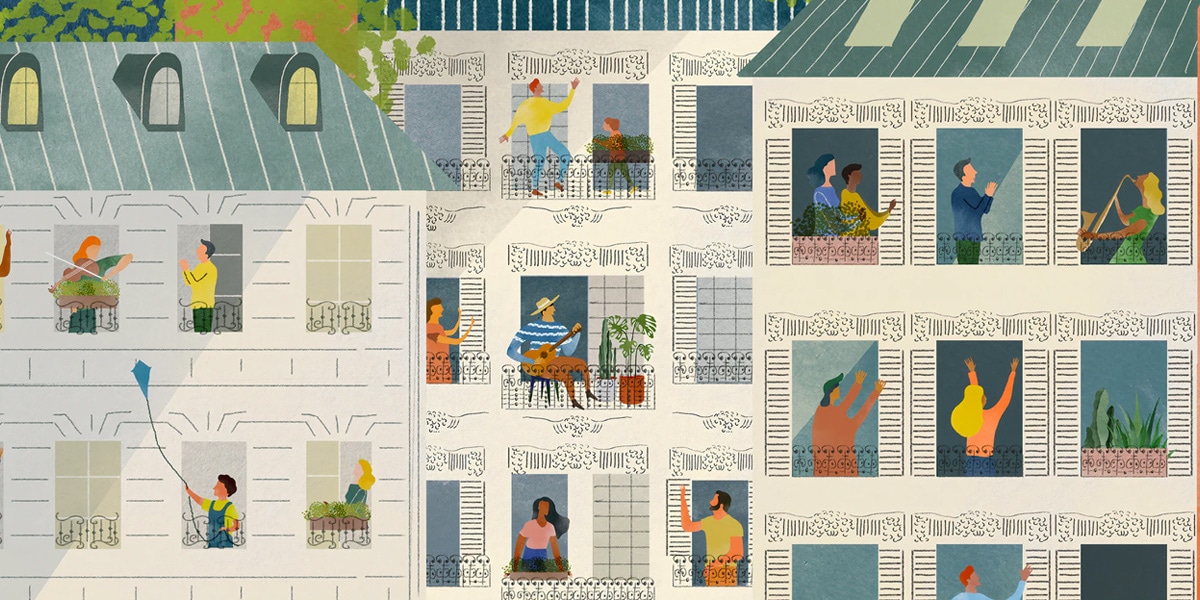
Mutuality of care in a pandemic
Opinion + AnalysisHealth + WellbeingRelationships
BY The Ethics Centre 9 SEP 2020
In the pandemic landscape, individual rights were challenged against a mutuality of care for our neighbours.
At the onset of the pandemic, The Ethics Centre Fellow, Dr Matt Beard, University of Queensland philosopher and health researcher Bryan Mukandi, University of Queensland, and Australian philosopher and Princeton PhD candidate Eleanor Gordon-Smith joined in conversation.
Together they discussed, dissected and explored a range of ethical issues rising during the early stages of the pandemic. This extract from the discussion considers Carol Gilligan’s theory around the ethics of care, and in particular her ideas around the mutuality of care and the idea that individual actions impact the whole.
Matt Beard, TEC Fellow:
One of the things that I keep coming back to, is this quote from the feminist philosopher, Carol Gilligan, who championed an approach, “the ethics of care”. She talks about this idea that we live on a trampoline, and whenever we move it kind of affects everybody else in the same way, it makes other people wobble, your activities cause discomfort to others.
And one of the things that this pandemic has crystallized for me is this sense that, this whole idea of this atomized individual with rights that cluster them off and divide us from other people, is kind of illusory. We are radically dependent on other people, we have this interdependence and these mutual obligations that inform our moral response.
And that got me thinking about how difficult it can be to muster that sense of mutual obligation. In a society that does just talk so heavily about ourselves as individuals, we’ve been conditioned to think about ourselves in almost exactly the opposite way to the way that this response requires us.
Have I set this up in the right way? Is it true we’ve been conditioned in this way? How do you think about this?
Bryan Mukandi, Philosopher:
It’s really complex, because on the one hand I think you’re absolutely right. I love that metaphor of the trampoline, and I completely agree, this idea of this autonomous free liberal individual, it just doesn’t stand up to scrutiny. But at the same time, on the other hand, the fractiousness and fracturedness we’re witnessing in the US applies here too, in some really interesting ways, right.
So, yes, we’re all on this trampoline, but the real estate that you occupy on that trampoline makes the world of difference. And we have a kind of social structure, social organisation where there’s an investment in occupying good real estate [so] that when something happens – a natural disaster, a fire, floods, a pandemic – there’s an investment in being in a position of being able to enact something like that illusory autonomy.
I think about Martin Luther King’s idea of an inextricable “network of mutuality”. But he raises this in a sort of moment where African Americans are in a particular kind of relationship with white America. He acknowledges that there’s this mutuality, there’s this connection, but the nature of this connection is one that’s really detrimental to some groups of people as opposed to others.
And I also think about Frantz Fanon contribution to Hegel’s dialectic of recognition. This idea that our selfhood emerges in relationship with others, it’s like it falls apart in the colony because in the colony the white doesn’t want the colonized recognition, they want their labour.
So I think, while on the one hand, COVID has shown us that this ideal of autonomy – it doesn’t stand up to scrutiny. It’s in really interesting ways though, I think it may, at least for some groups of people, legitimate this project of striving towards that kind of autonomy of occupying the best possible real estate on that trampoline, as opposed to reconfiguring the trampoline itself.
Eleanor Gordon Smith, Philosopher:
It’s a really good question.
And like Bryan, I think it’s a very complex one and one that we’re not going to compress either now or in a pandemic writ large. One thing I think that is kind of a shame for me living in the states and seeing the way the states is covered internationally is the way that a lot of the pressure to reopen is construed in these kinds of individual autonomous terms.
I have a lot of family and a lot of friends who I think are really genuinely very concerned about my proximity to New York at the moment. They feel like crisis, real proper, ‘everyone’s dead’ crisis, like blood –in–the–streets–type crisis, is right around the corner.
And my suspicion about why they feel like that is that they’ve seen these videos of women hanging out of cars at intersections blowing the horn at medical workers or protesters walking into government buildings, people with the American flag painted on their face, holding banners about the right to return to work.
These people are both, they’re a very individualistic face of this movement and the movement that they claim to be espousing is very individualistic. They’re making claims about people’s individual rights to get back to work and they are doing so claiming to speak as individuals.
But one of the things that I think it’s a shame that [coverage] obscures is that the pressure to reopen America comes from the fact that it’s a non-accidental feature of the US American system and the US economic system that it wants people to be back at work more than it wants them to be safe and well.
We encounter that from the mouths of individuals who present themselves as autonomous in saying things like ‘the cure cannot be worse than the disease’, but the pressure isn’t just from rhetoric or from individuals, it’s from the way the system is set up.
You look at the kinds of costs and debts that Americans incur just for functioning. Like if you get sick, that costs money and that creates debt, if you have a higher education system, even one that is continuing on Zoom at the moment, that costs money and that causes debt.
Both of these things coupled with just the usual systems of credit means that most Americans are in eye–watering amounts of debt, and then debt has interest which means that you’re incentivized to get back to work as fast as possible and you put people in a position where it’s not only rational but critical to get back to earning money because it costs money to earn less.
The way the system functions is such that not only do you create all these pressures, it’s then coupled with this narrative of individualism, telling people that both the source of the problem and the nearest solution is to be conceived of in these individualistic autonomous senses.
It’s a real shame when we reinforce and circulate these images of Americans protesting in the way that they are right now, because we obscure the fact that even these apparently maniacally individual faces are in fact the product of the same system that crushes the rest of us.
This is an extract from a live-streamed event. Watch the full conversation from FODI Digital event, Ethics of the Pandemic, below. Don’t miss our next live-stream events at www.festivalofdangerousideas.com.
Ethics in your inbox.
Get the latest inspiration, intelligence, events & more.
By signing up you agree to our privacy policy
You might be interested in…
Opinion + Analysis
Health + Wellbeing, Society + Culture
Does your body tell the truth? Apple Cider Vinegar and the warning cry of wellness
Big thinker
Health + Wellbeing, Politics + Human Rights, Relationships
Big Thinker: Judith Butler
Opinion + Analysis
Health + Wellbeing, Relationships, Science + Technology
Hallucinations that help: Psychedelics, psychiatry, and freedom from the self
Opinion + Analysis
Relationships


